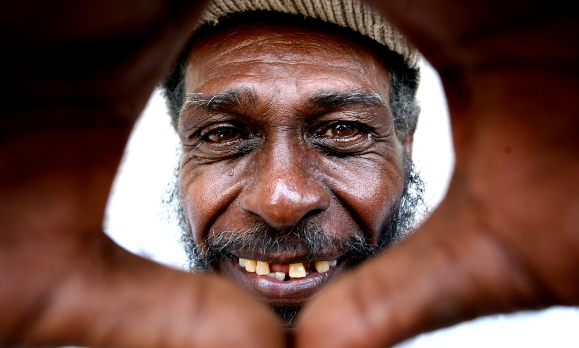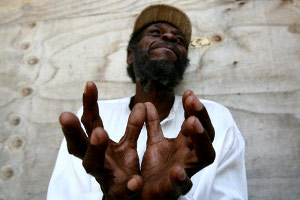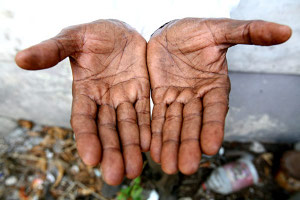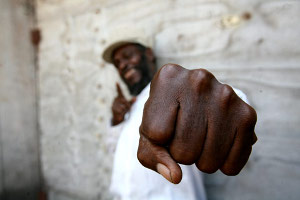Articles about reggae music, reviews, interviews, reports and more...
Interview: Prince Alla Part 2
- Home
- Articles
- Interviews
- Interview: Prince Alla Part 2

Interview: Prince Alla Part 2
"They were too much gun tune and I said "No. Nah do that man. Me just gwaan catch some fish""
Sampler
In part two of this exclusive interview with Prince Alla, he recalls how he quite music to become a fisherman in the 1980s, before European interest brought him back to touring and recording. He also discusses his problems with the music industry and suggests the way forward for the Rastafari movement in Jamaica.

What did you do in the 80s when the roots music went out of fashion?
I started fishing! I started catching some fish because some producers would come sometimes and say, "Me like you a do some song you know?" but they were too much gun tune and I said "No. Nah do that man. Me just gwaan catch some fish" because I lived right beside the fishing beach. I'd just go down there and you could get a boat for hire for cheap so I'd get some bait on my line and just go catch fish. Eat some, sell some! (laughs)
How long did you stay a fisherman? How did you restart your career?
Not too long. Until the 90s still. There was a man from Switzerland named Asher Selector who was in Jamaica in about '98 and came to my home. The brethren said, "Bwoy, Alla, them a want you in Switzerland you know" and I said, "What? I don't have a passport" and he said, "What?" and I said, "OK I'll get a passport". So in '99 I started travelling to England and it started from that so I didn't do the fishing so much.
Did Blood and Fire help your career by reissuing your material in 1997?
Blood and Fire was a great help. Because it was the first time in my life that I ever really got money off of music. So God bless those Blood and Fire people - straight. Those people helped me know I could get some money. Steve Barrow came to Jamaica through Freedom Sounds and found us and said they wanted to re-release those songs there. Because in those times that man would come for old songs that they wanted to re-release. They'd just come and look for the artists and the promoter directly. People like me and Congos, they'd come directly to us. I got paid from them and got my royalties every time. But I signed up for ten years and I think the ten years are up now.
 Blood and Fire was a great help. Because it was the first time in my life that I ever really got money off of music
Blood and Fire was a great help. Because it was the first time in my life that I ever really got money off of music
You've recorded for UK producers and engineers like Gussie P, Jah Warrior, Ras Muffet, - who is your favourite producer working today?
From the UK? (laughs) Jah Warrior man. I'd just sing man and those tunes would come forth. And went I went to Jamaica that man would send my royalties straight same way. Big up yourself Jah Warrior. He was my favourite one.
How does the roots of today compare with the old days?
Well with the roots of today, I feel like too many artists are following the same trend and the same melodies. Because if you listen to Luciano you hear plenty of people want to sound like Luciano with the same melodies.  It's not like the first time when you'd listen to Ken Boothe or Alton Ellis and you'd hear different melodies and everybody had a different distinction. Nowadays if a man sings about fire, everybody else wants to come and sing about the fire too and use the same melodies he used to sing it. Same pattern. Less creative the business is, and more of a money thing now. The first time a man would say, "I want to make some money" but they first time they'd also say, "Man I want create something. I want to sound like myself". Now a man wants to sound like the next man because he feels he can get the money quicker.
It's not like the first time when you'd listen to Ken Boothe or Alton Ellis and you'd hear different melodies and everybody had a different distinction. Nowadays if a man sings about fire, everybody else wants to come and sing about the fire too and use the same melodies he used to sing it. Same pattern. Less creative the business is, and more of a money thing now. The first time a man would say, "I want to make some money" but they first time they'd also say, "Man I want create something. I want to sound like myself". Now a man wants to sound like the next man because he feels he can get the money quicker.
But it's nice when modern artists reference you isn't it? Like when Tarrus Riley and Dean Fraser used the Stone rhythm for his song One Two Order. How does it feel to see the new generation of Rasta artists building on your foundation?
It felt good for me man. Because from him doing that the people remembered me again. They said, "Remember that artist who do him thing there? Prince Alla! Yeah man!" so he really did a good thing and kept my memory alive. I love it because the musicians that played it where the same musicians that originally played it. Sly & Robbie same way so it still had the vibes same way. They checked me and told me that they did it and I said, "Yes man. Big up yourself".
What do you think of the heavy sounding digital UK roots that you have recorded in recent times?
Well to tell you the truth about me, from the time I was small my father used to have a little gramophone where he had all different records. So I used to listen to all different records, jazz and all those things there. Sometimes I would really feel the jazz and say, "Wha???" sometimes I'd really feel the calypso, the soca and so on. I just love music. Any music can make me feel certain things in my soul. Any rhythm because rhythms are just rhythms. Anyone who can make me feel Jah power there then I just love it. It doesn't have to be reggae - it can be jazz or calypso or whatever. But if I feel it, I feel it. I mostly sing reggae because when you're used to something you do it a certain way, but I love all music and I listen to all.
You played in the UK very recently. Do you find Jamaican audiences want to hear you play different tunes to UK ones?
Well I'll tell you the truth again. There was only one song I really released in Jamaica and it was I Man Saw A Stone. In those times, most of the promoters would just sell your tune in Europe and tell you that, "Nothing a gwaan". Then somebody would come from Europe and say, "You know Prince Alla I hear your tune and them thing there..." and I'd go to the promoter who would say, "Somebody up there pirate me! I'm going to go up there and sue them!" and the artist relaxes back again thinking they are going to find them and sue them. So in those times I never used to get money my brethren but it never used to trouble me because I loved the music so much. And I was just a single man with no family and no bills so I could just live down at the beach and sleep in a ranch and then go to sea and catch some fish and eat. But when you start having responsibilities you see it shouldn't go so.
How are you being treated now in the music business?
Better than before. But still not by the local people like my brothers and sisters here. Mostly by people in England or Asher Selector in Switzerland. I know the vibes in Jamaica so I don't really get too involved with the promoters here.  It's not all - because you have good ones still - but to get money from most producers in Jamaica you have to have a posse. You have to have five, six, seven, eight man who'd walk with you and they have to be bad boys so the promoter sees you with them and has to pay you up. You have to have people to watch your back and bodyguards and I don't have those things so I prefer to deal with people in Europe more. They are more business people and deal with official things more whether black or white. Like I've been doing some things recently with a brother named Jah Youth and he is a black man and he is really good. In Jamaica it's not that way! (laughs)
It's not all - because you have good ones still - but to get money from most producers in Jamaica you have to have a posse. You have to have five, six, seven, eight man who'd walk with you and they have to be bad boys so the promoter sees you with them and has to pay you up. You have to have people to watch your back and bodyguards and I don't have those things so I prefer to deal with people in Europe more. They are more business people and deal with official things more whether black or white. Like I've been doing some things recently with a brother named Jah Youth and he is a black man and he is really good. In Jamaica it's not that way! (laughs)
 To get money from most producers in Jamaica you have to have a posse
To get money from most producers in Jamaica you have to have a posse
As well as making music abroad you also appeared in the American film Holding On To Jah for Harrison Stafford and Roger Landon Hall. How was that experience?
I almost forgot about that one! Big up that brethren there man! That brethren is a good brethren to me materially and spiritually. I know when that comes out it will be nice because there are some nice interviews with nice artists and nice songs. He showed me a little clip of it but it wasn't finished.
I've seen a preview copy. It has come out really well.
Big him up. Rastafari son that. A bassie by the name of Andrew brought him to me. So I went down to the fishing beach in Greenwich farm and did the interview with him. Then he came back and said it was going in the film and gave me some money and that so I say, "Yeah man, respect man!"
You got quite angry at one point when talking about Babylon and how Rasta people were treated when you were young.
Yeah man. Well sometimes when you're talking about things at that particular moment you really feel it you know? But it's not like it's really on me still because it was a long time ago and we've had a long time to get ourselves straight so it doesn't happen to us again. So the thing that is on us now as a Rastaman to really get himself unified and organised because those things haven't happened. Because the reason those things happened to us where because we didn't unify and have a voice. When you are single you don't have a voice and everybody can come and mash you and step on you. So that is the focus I have now to really come to unify and have a voice. Things are better now - a million times better. Through even the reggae music too. When I was a youth the Rastaman couldn't get any work. Nobody wanted him around the place. Nowadays you have a Rastaman who is a doctor in the Kingston public hospital. Rastaman are in politics big. Rastaman are pilots now. Rastaman have Bob Marley in the music so there are enough ways Rasta can edify themselves.
So Rastafarians need to be involved in the system?
It's education and not just the spirituality thing alone. Rastafari is The Almighty but you have to have the education and the technology too to live in this age. The Rastaman is more advanced. One time the Rastaman would just go by himself into the country and leave the system and there was no business and all those things there. But now you have business in what goes on because everything affects you. You can't be in the hills and hide by yourself. The system can still come and affect you so you have to stand more now. You cannot depend upon the donkey or the mule to carry things. In those days the Rastaman didn't deal with trucks or buses but now you have to deal with those things because the donkey can't work again. Animal brutality that! (laughs)
 Rastafari is The Almighty but you have to have the education and the technology too to live in this age
Rastafari is The Almighty but you have to have the education and the technology too to live in this age
What issues do you face as a Rastafarian living in Babylon today?
We're free now but it's the way we have to free ourselves. It's just the unity of the Rastaman. That is the only thing. Because Jah has done everything already. Everything is set up already but it's just us now. The greatest issue is we unify ourselves. More Rastaman in Jamaica need to come and make schools for children.  Unity, not just through talk alone, but by taking some of the millions that they have and set up some things for the youth like schools so they can learn about their ancestry and Marcus Garvey and have a better tomorrow. Tomorrow is a change and it's not today. So we should start to set it now. We plant the seed now but it's not the same day that the seed is going to burst out of the ground. So we set it now and Rastaman should start up more schools and help the youth learn about themselves and see that violence is not the key. Violence is not the ultimate - it's love. War is not the ultimate - it's peace.
Unity, not just through talk alone, but by taking some of the millions that they have and set up some things for the youth like schools so they can learn about their ancestry and Marcus Garvey and have a better tomorrow. Tomorrow is a change and it's not today. So we should start to set it now. We plant the seed now but it's not the same day that the seed is going to burst out of the ground. So we set it now and Rastaman should start up more schools and help the youth learn about themselves and see that violence is not the key. Violence is not the ultimate - it's love. War is not the ultimate - it's peace.
Why do people turn to violence?
Because growing up in Jamaica under a certain amount of slavery and oppression most people have a screw face but most of them don't realize they can take the screw off of their face. Most of them blame people and say, "Why has them put me in all of this you know?" so they just stay in there. But somebody put you in so you come out now. But most people just stay there and complain about people who put them there so the next generation finds themselves there too. When they need to just think about coming out now and have unity with each other and set up things. Like education and technology.
What else can be done?
In Jamaica there are plenty of Rastaman who have plenty of things but most of them don't do the right things with the things they have. Like set up factories to make things. Because when I was a youth the Rastaman used to be creative. They'd make pure mats, brooms, carvings all those little kinds of things but nowadays you don't see that so much. Those things are missing. More youth end up on the street with no things he can be doing when he doesn't have food. He just has to beg it or rob it. So more things need to be set up and Rasta must do that. We can't leave it to the church alone. Everybody who talks about God should make sure the people have food. The Rastaman has to do it too. And don't be selfish. I'm not saying all Rasta are like that. There are some Rasta that are doing great things in Jamaica but they want help from more Rasta. Big up all the Rastaman doing great things in Jamaica but it's not just to issue the corn but to help the people plant it too.
Read more about this topic
Read comments (1)
| Posted by Rootsman on 07.20.2010 | |
| Great interview.. Maximum raspekt to the old skool foundation artists who still know about creativity and consciousness in the music industry nowadays.. | |
Comments actually desactivated due to too much spams
Browse by categories
Recommended Articles
Latest articles
Recently addedView all
© 2007-2025 United Reggae. All Rights Reserved. Reproduction in whole or in part is prohibited. Read about copyright
Terms of use | About us | Contact us | Authors | Newsletter | A-Z














